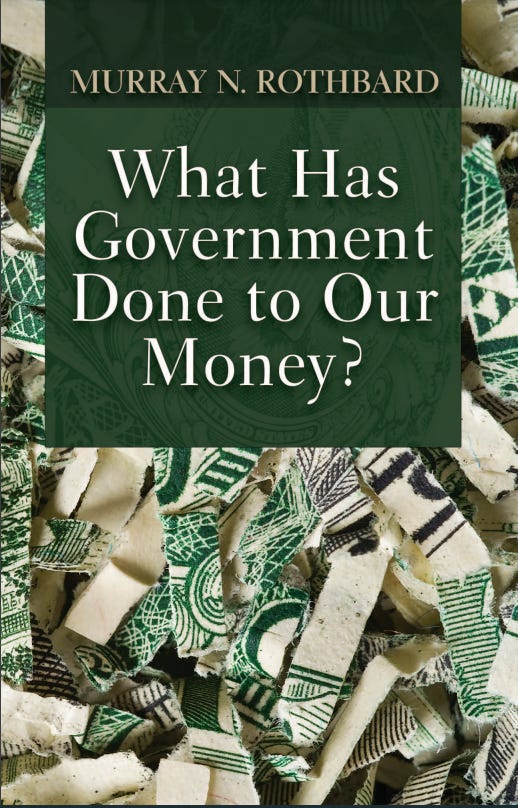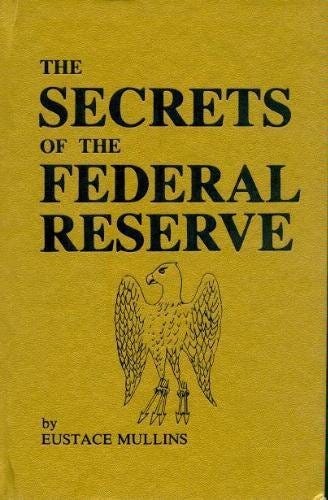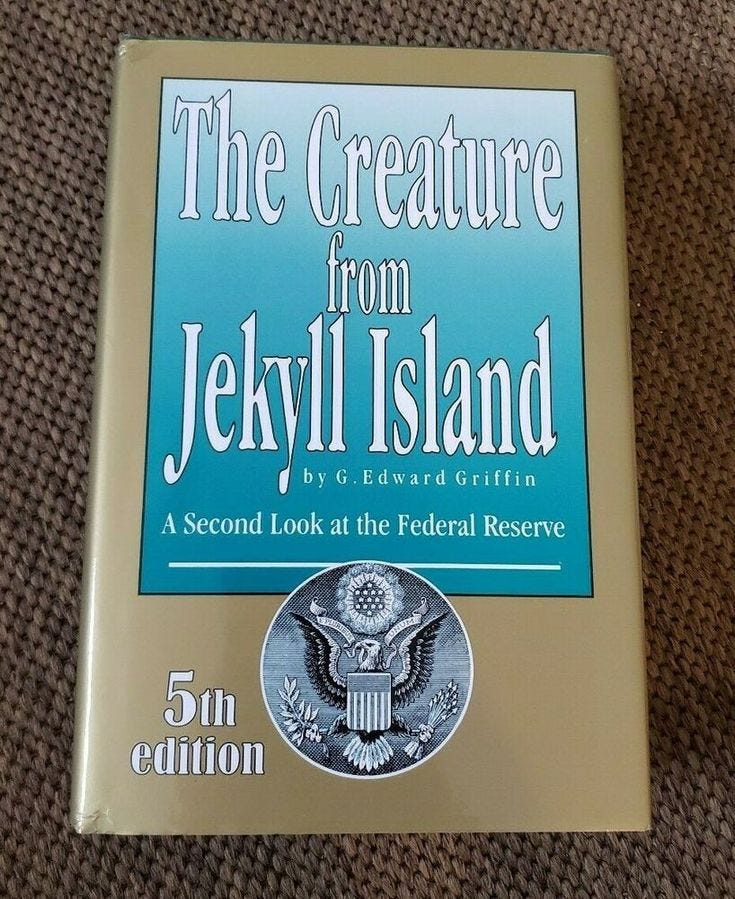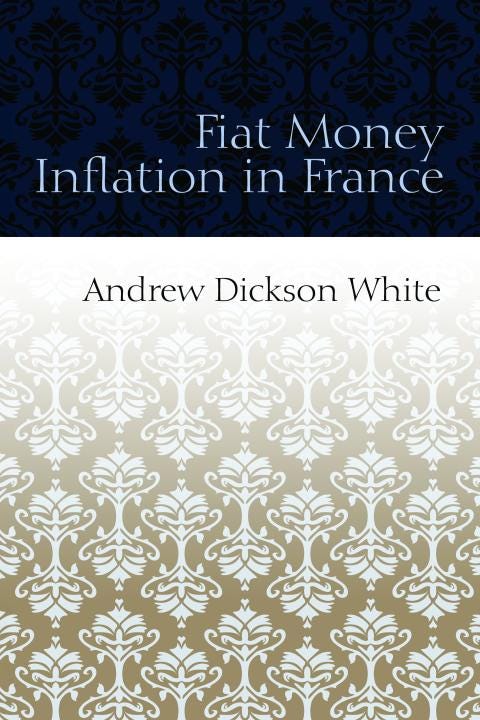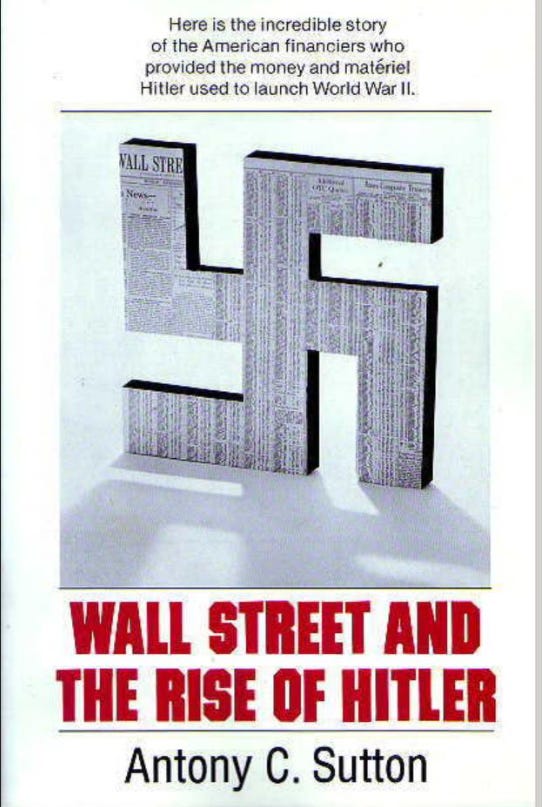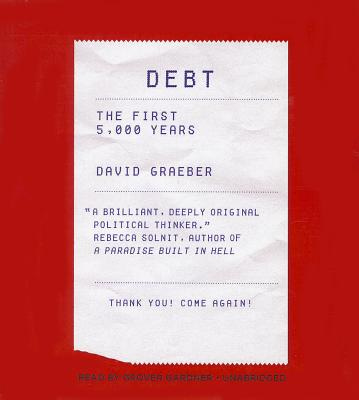Accessible Books on Finance and Economics
This list is dynamic, and will grow, potentially rather large. There is no particular order, just added as I get the time and remember them. If there is any demand I will sort into my reading order. Forced to choose something for a lonely desert island, I would take all the Rothbard, especially The Rothbard Reader.
Murray Rothbard - everything
Murray Rothbard, academic economist, libertarian, historian, activist…what can I say. If you read nothing else, understand nothing else, then any and all Murray Rothbard is both the journey and the destination. There is NO excuse. Everything important is here, both free pdfs or if you can buy the books and support the Mises Institute please do1…https://mises.org/profile/murray-n-rothbard
The Secrets of the Federal Reserve, Eustice Mullins, 1952
The granddaddy of Federal Reserve books. A must read for anyone who wants a deep understanding of the criminality, fraud, and corruption that led to the founding of the U.S. Federal Reserve System.From the foreword
“The original book…was commissioned by the poet Ezra Pound [who] was a political prisoner for thirteen and a half years…A [1955] German edition…was seized and the entire edition…burned by government agents…The U.S. Government [who in 1955 post-war Germany had total control] refused to intervene”The Creature from Jekyll Island, G. Edward Griffin, 1994
A legendary book from a legendary author and researcher. G. Edward Griffin is still giving interviews at 94 (as of Feb 2024), and is as lucid and on-point as he was in his 1960s films and interviews. Read this!The Federal Reserve Conspiracy, Anthony Sutton, 1995
Another legendary author, another must read if you want to get your teeth into the corrupted central banking system we have today.
Money, whence it came, where it went, John Kenneth Galbraith, 1979
I found the Bantam Books edition of this influential book in a secondhand bookshop circa 1990. It said money was created out thin air. I thought “what! I don’t believe it!” So I looked. Took a few years to get the evidence, but it turns out he was right.The Death of Economics, Paul Ormerod, 1997
“…how and why economics should be recast to reflect the current ills of Western society…Integrating ideas from biology, physics, artificial intelligence, and the behavioral sciences…”
Ormerod was an academic economist with a unique perspective. Strongly influenced my thinking when I read it in the early 2000s. It’s critique of modern neo-classical economics will still be relevant, maybe the rest too.Debunking Economics, Steve Keen, 2001
A blistering critique of neo-classical economics, in my opinion the second edition (shown) is the one to get. Very accessible to those who have decent university mathematics. Engineers, physicists, chemists, mathematicians etc. Might be a bit much for your average economist, who receive terrible mathematical training. The problem is they don’t know it, believe the opposite, and here we are. Keen is an economist who can do math. He is doing some very interesting modelling; if you’re interested look at Keen’s Minsky software.The De Moneta Of Nicholas Oresme And English Mint Documents, 1956
The original Oresme seems to have been written sometime before 1370. This translation is from 1956. From the Mises website:”Nicole Oresme has been called the most brilliant scientist of the 14th century: mathematician, musicologist, physicist, philosopher, and economist. On top of that, he was a Bishop and a theologian…Oresme's treatise on money, De Moneta, provides a detailed account of the function of money and the effects of inflation…[it has been argued that] Oresme was the first theorist to present a fully worked out ethics of money, one that shows the sheer immorality of government monopoly over money and the social effects of debasement.”
Fiat Money Inflation in France, Andrew Dickson White, 1933
A disturbing insight into the destruction to societies that result from fiat currencies. From the Mises Institute:It records the most gigantic attempt ever made in the history of the world by a government to create an inconvertible paper currency, and to maintain its circulation at various levels of value...But the attempts failed. They left behind them a legacy of moral and material desolation and woe…It ended in the complete financial, moral and political prostration of France — a prostration from which only a Napoleon could raise it.
Banking Under Difficulties, G.O. Preshaw (1888)
I’ve got a first edition of this! I was so excited when I found it (yes, tragic). It has been republished and can be purchased here2, and it’s available as a LibriVox audiobook here. George Preshaw was a gold buyer for the Bank of New South Wales in the goldfields of Victoria, New South Wales and New Zealand. His description of life on the goldfields of New Zealand’s wild and very wet West Coast is particularly interesting, as George was involved from the late 1860s at the very beginning of the ‘rush’.Wall Street and the Bolshevik Revolution by Sutton, Antony C. (1974)
From goodreads.com:…Antony Sutton establishes tangible historical links between US capitalists and Russian communists…the role of Morgan banking executives in funneling illegal Bolshevik gold into the US; the co-option of the American Red Cross by powerful Wall Street forces; the intervention by Wall Street sources to free the Marxist revolutionary Leon Trotsky, whose aim was to topple the Russian government; the deals made by major corporations to capture the huge Russian market a decade and a half before the US recognized the Soviet regime; and, the secret sponsoring of Communism by leading businessmen, who publicly championed free enterprise…
Wall Street and the Rise of Hitler - Antony Sutton (1976)
From goodreads.com:Penetrating a cloak of falsehood, deception, and duplicity, Professor Sutton reveals…that key Wall Street banks and American businesses supported Hitler’s rise to power by financing and trading with Nazi Germany…the catastrophe of World War II was extremely profitable for a select group of financial insiders…J.P. Morgan, T.W. Lamont, the Rockefeller interests, General Electric, Standard Oil, and the National City, Chase, and Manhattan banks, Kuhn, Loeb and Company, General Motors, Ford Motor Company...
Note: this trading with the enemy continued well into the second world war.
The Market For Liberty by Morris and Linda Tannehill (1970)
The name speaks for itself. In my opinion one of the most important books almost no-one has heard of.The Technocracy Trilogy - Patrick Wood
This is everything that you will ever need to understand Technocracy from its genesis in the 1930s, to the Rockefeller connection in the 1970s, to its rebranding in the 1990s as Sustainable Development by the United Nations, to full-blown Scientific Dictatorship in the 2020s. Now that AI has emerged as the ultimate weapon of Technocracy, the end of reality as we have known it may be near.When Money Dies: The Nightmare of Deficit Spending, Devaluation, and Hyperinflation in Weimar Germany by Adam Fergusson
Debt: The First 5000 Years — David Graeber
I have no affiliation, connection, or interest in the Mises Institute, except to morally support the excellent work they do.
I have no affiliation, connection, or interest in the publisher, though I own a copy of their reprint.



